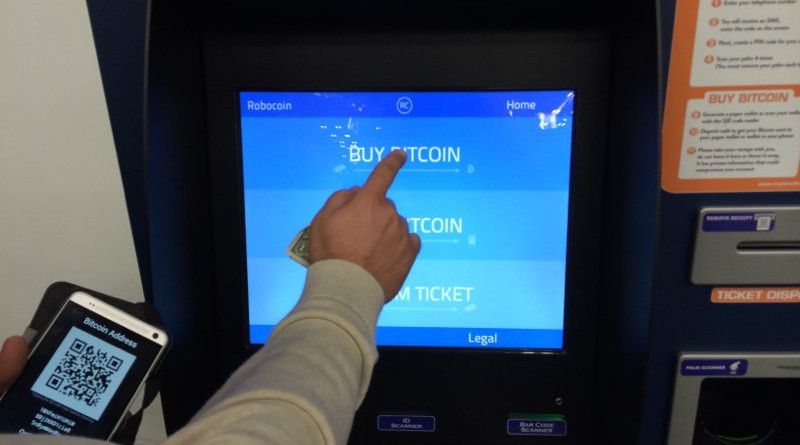A Bitcoin A.T.M. Comes to a New York Deli
By Ian Parker
A bitcoin A.T.M.—a machine with the body of a regular A.T.M. but the soul of a lottery terminal—was recently wheeled into Mario’s Gourmet Deli, on the corner of Amsterdam Avenue and 106th Street. Mason Yang, an A.T.M. technician wearing a jade stone around his neck and black latex gloves, was pushing the handcart; Josiah Hernandez, the chief strategy officer of Coinsource, which owns and operates a hundred and twenty-seven bitcoin A.T.M.s nationally—making the company the market leader—held open the door. He had a Ferrari-branded bag over his shoulder. The two young men had been discussing a news story: in South Texas, a technician had locked himself into a space behind a bank’s A.T.M.; he had eventually been rescued after pushing a handwritten note, pleading for help, through the machine’s receipt slot. “Someone actually stopped!” Yang said. “In New York, no way someone would stop, no way.”
At the back of Mario’s, past the grill, there were a few shelves of groceries and a conventional A.T.M. Coinsource, fast expanding in the city, had persuaded the store to add a second machine, but the man behind the counter hadn’t been told, and was bemused. He called his boss. Hernandez and Yang waited. Yang said he was disappointed that the unlucky technician in Texas had remained anonymous. “I’d release my name if I got locked into an A.T.M.,” he said.
A Coinsource A.T.M. accepts dollars and in return adds the bitcoin equivalent (less Coinsource’s seven per cent) to a customer’s digital wallet. A year ago, one bitcoin was worth six hundred dollars. This summer, the value passed four thousand dollars. Coinsource’s typical customer, Hernandez said, was someone of modest means, with limited or no access to traditional banking, making an experimental investment of twenty or thirty dollars. “With a Lotto ticket, it’s a very binary outcome,” he said. “This leads to something less binary.”
Kalpesh Patel, the owner of the deli, and of two others, in Brooklyn, arrived. He explained that a manager who was away that morning had made the Coinsource decision. Patel was good-humored but skeptical. “It’s legal, right?” he asked.
Hernandez promised that it was.
“You’re going to pay now?” Patel asked. A typical convenience-store A.T.M. pays a commission on transactions, but Coinsource pays a flat monthly fee that starts at three hundred dollars.
“I can get it today,” Hernandez said.
“No contract, right? Month by month?”
Hernandez told Patel that his manager had, in fact, signed a contract: “It’s very basic, it’s one page.”
“Is it legal?” Patel asked again.
They agreed that the new machine should go alongside the existing A.T.M. Patel asked an employee to clear the shelves that it would be blocking; the man grumbled as he dropped ramen and cans of soup into milk crates. “And maybe move the Goya a little bit?” Hernandez said, referring to jars of adobo seasoning. The man didn’t reply.
Yang used to be the head teller in a bank. “They’re taking away human banking even though they’re trying to promote human banking,” he said. “So I thought, Why not be a technician, fixing the machines?” It was important to know how to repair machinery, “in case the world goes bad, and ends,” he said. He turned his baseball cap to the back and took out his drill. “I always drill these into the ground. Even if the store owner says no, don’t do it, I strongly advise them. Because New York never sleeps.” He drilled, at first cautiously, through terra-cotta tile.
Fifteen minutes later, the machine was ready to be turned on. A line of text on the screen read “The last attempt to resume the system from its previous location failed. Attempt to resume again?”
“A software issue, yes,” Hernandez said. Customers reached around him for tuna fish.
He needed to press Enter, but to do that he needed a keyboard. Patel didn’t have one. Hernandez and Yang discussed whether RadioShack still existed. Hernandez asked, “You think a GameStop would have one?” He called; they didn’t.
Hernandez went outside. Across Amsterdam Avenue, there was a branch of La Nacional, the money-transfer chain.
“How’s it going?” Hernandez asked a clerk, through glass. “Weird question, is there any chance I could use your keyboard for five minutes?”
The woman looked apologetic.
“I could pay you. For five minutes. It’s right across the street.”
“No, I don’t think so.”
“I understand, I understand,” Hernandez said. But, once more: “It’s an A.T.M. that’s broken, I need to fix it, but I need a keyboard to fix it.”
She shook her head.
“Lo siento, lo siento,” he said. “Gracias.”
She buzzed him out the door. “So close and so far,” he said quietly. ♦

